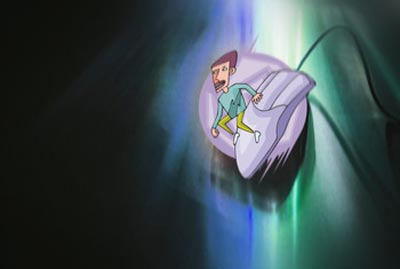Todd: Eli, could you talk a little bit about what you study to be an animator and how the industry has changed over the years?
托德:艾丽,你能谈谈你学了什么专业才能成为动画师的吗?还有这个产业这么多年有什么变化?
Eli: Yeah, well, I actually studied, the degree I did was a graphic design course, which taught you art, every aspect of graphic design but they looked at graphic design as actually communication design which is basically just trying to get a message across a certain way thought the use of graphics, you know graphical methods, so I mean, that doesn't necessarily mean just you know text, words, on a screen, you know, words on a poster. I mean, people's people's views of graphic design is usually like posters, advertising, um, adverts in magazines but we were sort of made to think that that is just a tiny bit of graphic design, I mean you can communicate message, through any medium, you know even sort of acting, and stuff like that, they were, it was really that broad so, obviously with my love of anime I chose animation, I mean, it's something I've been interested in for a long time and I do 3D computer animation kind of like "Toy Story" but obviously not as good. I was actually the only person on my course doing that, so it was quite a challenge. I had an amazing animation tutor, who had got some pretty amazing portfolio behind him, to help me out, and if it wasn't for him, I probably would have torn my hair out years ago and maybe even quit the course cause I, there was a big, dispute with sort of my view of computer animation, what I was interested in with the graphic design tutor's views, they were all about deep meaning and you know, messages behind work and I was actually about learning how to animate well, you know the techniques of animation. I mean it's always very important to have the background skills of ideas because you can be technically good at something, you can be able to use a computer program brilliantly, but if you don't have the sort of ideas or background then you're never going to be able to make a good piece. I mean, I've heard that Pixar, the company who make "Toy Story" actually hire actors instead of animators to do their animating. They hire them for their acting skills and then they teach them how to use the software afterwards, cause actually, that's what it's about, it's making characters act, it's whatever it is, whether it's a coke can or a book, if you want to give that a personality, you got to think about how you're gonna give this inanimate object a personality, how are you going to make it looked scared, how are you going to make it look happy, um, that's what I was interested in, sort of techniques of learning how to do that, so, yeah, it was a struggle but it was definitely worth it in the end, and I think I'll go on to have a good career.
艾丽:当然,实际上我在大学修的学位是平面设计,这个课程会教你美术,有关平面设计的所有方面,但是他们把平面设计看作通讯设计,基本来说就是试图通过特定的方式得到信息,对图形的使用进行思考,你知道就是图形分析,所以我的意思是,这不一定意味着你只要知道屏幕上的文本、文字,或者是海报上的文字就可以了。我是说,人们通常认为图形设计就是类似海报、广告、报纸上的广告这样的东西,但是我们则认为这些只是图形设计中的一小部分。你可以通过任何媒介传递信息,你知道,甚至是动作这样的东西都能传递信息,所以它的概念非常广,很显然我选择动画师这个职业是出于我对于动漫的热爱,动漫是我很长时间以来一直感兴趣的事物,我会做类似《玩具总动员》这样的3D电脑动画,但是显然做得并没有那么好。实际上我是这个课程中唯一一个从事这个职业的人,所以这是很大的挑战。我的动画导师非常了不起,他有一些非常棒的作品组合,总是能帮助我,要不是他,几年前我可能就泄气了,可能甚至会退出这个课程,因为我当时对电脑动画的看法有很大的争议,我感兴趣的是图形设计导师的见解,那些都是深层意义,你知道,作品背后的意义,实际上我学会了如何制作好的动画作品,你知道就是动画制作的技巧。我是说,拥有思想的背景技巧非常重要,因为你可以在技术上擅长某些事情,你能更出色地操作电脑程序,但是如果你没有思想或是背景,那你就根本不能做出好的作品。我是说,我听说皮克斯公司,就是那家制作出《玩具总动员》的公司,实际上他们在制作动画作品时雇佣演员而不是动画师。他们因为演员的演技而雇佣他们,之后他们会教授演员如何使用软件,因为实际上,这就是制作角色表演的方式,无论是什么,是可乐罐还是一本书,如果你想给予那个事物个性,你就要思考你如何赋予无生命的事物个性,你怎样能让他们看起来可怕,怎么能让他们看起来高兴,嗯,这就是我感兴趣的事物,类似于学习如何制作的技巧,所以过程很艰难,但是最终一切都很值得,我认为我会有很好的前途。













